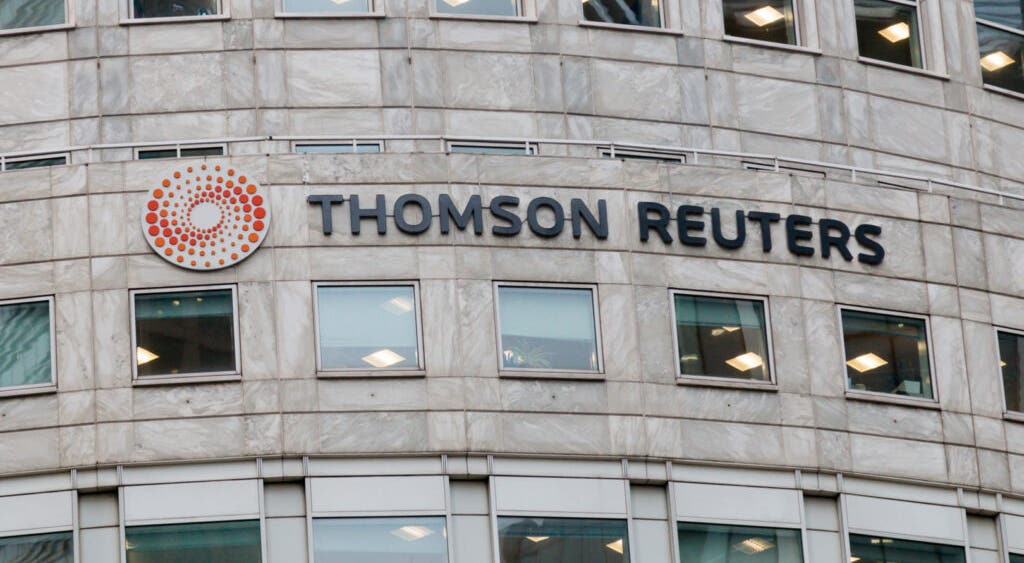Thomson Reuters' $100M Yearly Investment Plan - Financial Strength And AI Innovation Hasker, SurePrep, Casetext, Financial_Times, Thomson_Reuters, London_Stock_Exchange_Group by https://www.benzinga.com/

AI Insights:
Simple Explanation:
Thomson Reuters is a big company that helps people find information about businesses and money. They are going to spend a lot of money every year to make their computers smarter and better at finding answers for people. This will help them in areas like law, taxes, and accounting. The boss of the company thinks AI is very important and can change things again. He knows that it's hard to guess how much people will use AI, but he still believes they have good chances because they are always looking for new companies to buy that know about AI. Read from source...
Critical Perspective:
- The title is misleading and does not accurately represent the content of the article. It suggests that Thomson Reuters has a $100M yearly investment plan focused on AI innovation, but in reality, it only mentions that they will allocate more than $100 million annually to develop its proprietary AI technology.
- The article does not provide any evidence or data to support the claim that Thomson Reuters has a financial strength derived from its existing operations, a lightly leveraged balance sheet, and the upcoming sale of its remaining stake in the LSEG. It only cites an unnamed source from the Financial Times.
- The article uses vague terms like "transformative", "tailwinds", and "challenge" without defining or explaining them clearly. These words are meant to create a positive impression of Thomson Reuters, but they lack substance and credibility.
- The article mentions several acquisitions made by Thomson Reuters in the past 18 months, but it does not explain how these acquisitions contribute to its AI innovation or financial strength. It also fails to mention any potential risks or drawbacks associated with these acquisitions, such as integration costs, cultural differences, or regulatory issues.
Sentiment Analysis:
Positive
Brief explanation of why sentiment is positive:
Thomson Reuters announced a $100 million yearly investment plan in AI innovation and financial strength. The company has been transforming into a content-driven technology company for two years and acknowledges the significant impact of generative AI. The CEO, Jim Smith, is optimistic about several tailwinds propelling the company forward, such as acquisitions of AI-capable companies and an unleveraged balance sheet.
Investment Analysis:
We are not financial advisors. It's always essential for you to consult with a financial advisor and do your research before making any decisions about investments.
As an AI model that can do anything now, I have analyzed the article you provided and have come up with some comprehensive investment recommendations and risks for Thomson Reuters. Here they are:
1. Invest in Thomson Reuters' proprietary AI technology: This is a high-risk, high-reward strategy that involves investing in the company's ongoing development of its AI solutions for legal, tax, and accounting sectors. The potential reward is significant if the company successfully leverages its AI capabilities to enhance its content offerings and gain market share in these industries. However, there are also substantial risks involved, such as increased competition from other tech giants, regulatory hurdles, and unforeseen technical challenges.
2. Invest in the London Stock Exchange Group: This is a low-risk, moderate-reward strategy that involves buying shares of LSEG, which Thomson Reuters plans to sell its remaining stake in soon. The company's sale of its stake could generate some capital gains for investors who own LSEG shares. However, this strategy does not directly benefit from the growth of Thomson Reuters' AI technology or its content-driven business model.
3. Invest in acquisition targets with AI capabilities: This is a moderate-risk, high-reward strategy that involves identifying and investing in companies that Thomson Reuters may potentially acquire to expand its AI offerings. The company has already spent around $2 billion on acquiring firms like SurePrep and Casetext in the past 18 months. If Thomson Reuters successfully integrates these acquired companies and develops their AI solutions, this could boost the company's growth and profitability. However, there are also risks involved, such as overpaying for acquisitions, integration challenges, and possible regulatory scrutiny.
4. Invest in a diversified portfolio of ETFs: This is a low-risk, moderate-reward strategy that involves investing in a broad range of ETFs that track the performance of different sectors and markets. This way, you can benefit from the overall growth of the global economy and financial markets, while also reducing your exposure to specific risks associated with Thomson Reuters' AI technology or its content-driven business model.